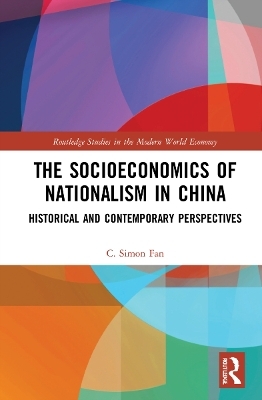
The Socioeconomics of Nationalism in China
Routledge (Verlag)
978-1-032-03018-0 (ISBN)
This book analyzes Chinese nationalism from the perspective of social economics. It posits a conceptual framework in which national status is treated as a "luxury" while material consumption is considered as a "necessity" in people’s preferences, which implies that popular nationalism tends to increase with economic development. The book extensively uses the tools of game theory and behavioral economics to analyze inter-ethnical and international conflicts in historical and contemporary China.
The author’s economic approach to the subject of nationalism brings fresh and critical insights into the Chinese historical events and relations with foreign countries. For example, it helps resolve the following puzzles: Why did most Chinese support an ethnic minority, the Manchus, to be their ruler after the collapse of the Ming dynasty? In the Boxer Rebellion, why did the Qing dynasty declare war against more than eight foreign powers when it knew well that any of the countries could defeat China easily? What are the fundamental causes of the 1962 Sino-Indian War and the 1979 Sino-Vietnamese War? Who is responsible for the bombing of the Chinese Embassy in Belgrade?
This book attempts to answer the questions based on the theories of social economics and rational choice, which will interest those researching on nationalism, China studies, international relations, history and political economy.
C. Simon Fan is Professor of Economics at Lingnan University, Hong Kong.
1.Introduction 2. Economic Development and Nationalism 3. Nationalism in Ancient China: hegemony in the Spring-Autumn Period 4. Nationalism in the Song Dynasty 5. The Establishment of the Qing Dynasty 6. The Qing Dynasty Was the Choice of Ancient Chinese 7. The First Opium War 8. The Second Opium War 9. China’s Loss of Territories at the End of the Qing Dynasty 10. The Boxer War 11. Reforms at the End of the Qing Dynasty 12. Why Did the Qing Dynasty Collapse? 13. The Second Sino-Japanese War 14. The Chinese Communist Party, the Soviet Union, and the Korean War 15. The 1962 Sino-Indian War 16. The 1979 Sino-Vietnamese War 17. The Bombing of the Chinese Embassy in Belgrade 18. Dispute over the Diaoyu/ Senkaku Islands 19. Epilogue: toward a Theory of "Optimal Nationalism"
| Erscheinungsdatum | 05.07.2022 |
|---|---|
| Reihe/Serie | Routledge Studies in the Modern World Economy |
| Zusatzinfo | 5 Tables, black and white; 6 Line drawings, black and white; 6 Illustrations, black and white |
| Verlagsort | London |
| Sprache | englisch |
| Maße | 156 x 234 mm |
| Gewicht | 453 g |
| Themenwelt | Geisteswissenschaften ► Geschichte ► Regional- / Ländergeschichte |
| Geschichte ► Teilgebiete der Geschichte ► Wirtschaftsgeschichte | |
| Geisteswissenschaften ► Philosophie | |
| Sozialwissenschaften ► Politik / Verwaltung ► Politische Theorie | |
| Sozialwissenschaften ► Soziologie ► Spezielle Soziologien | |
| ISBN-10 | 1-032-03018-6 / 1032030186 |
| ISBN-13 | 978-1-032-03018-0 / 9781032030180 |
| Zustand | Neuware |
| Informationen gemäß Produktsicherheitsverordnung (GPSR) | |
| Haben Sie eine Frage zum Produkt? |
aus dem Bereich


